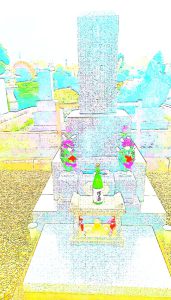「忘れられた道しるべ」
- 2024.12.29
- 月刊芳美
「忘れられた道しるべ」
テレビでの時代劇が途絶えたことを嘆きながら、賢次と今日子は鮨屋のカウンターに腰掛けていた。賢次の語り口はいつもどこか皮肉混じりだが、今日子はその語りを楽しんでいた。「お父さん、東野英治郎さんの水戸黄門が大好きだったの」と彼女が話し始めたとき、場の空気が少し変わった。懐かしさが静かに流れ、まるで鮨の小さな皿の上に、遠い記憶が添えられたかのようだった。
「じゃあ、東野英治郎さんのお墓にでも行ってみるか?」
賢次が突然言い出す。いつもの突拍子もない発想だが、今日子は微笑みながら、「面白そうね!」と応じた。こうして、二人の週末の予定が決まった。
墓参りという名の冒険
日曜日の朝、駅前のロータリーで待ち合わせた今日子は、賢次の車に乗り込んだ。二人はナビを頼りに、多磨霊園へと向かう道中、ふと家庭の話になった。今日子の父親は母親と折り合いが悪かったらしい。今も母親には会っていないと淡々と語る彼女だが、その声にはどこか寂しさが滲んでいた。「でもね、毎朝お父さんの写真に向かってお経を唱えてるの」と言ったとき、その小さな習慣が彼女の心をどれほど支えているのかが伝わってきた。
やがて多磨霊園の近くにたどり着いたが、狭い道路に阻まれ、花を買う場所を探して右往左往する。「近くで買えばよかったな」と後悔する賢次に、今日子は「まあ、これも旅の醍醐味よ」と軽く肩をすくめた。
忘れられた道しるべ
広大な霊園に足を踏み入れると、そこはほぼ迷路だった。地図を片手に車でさながらオリエンテーリングのような探索が始まる。今日子は「右、次は左」と的確に道案内をするが、賢次は少し道を間違えるたび、「これも冒険の醍醐味だ」と自分を正当化した。
ついに、東野英治郎の墓にたどり着いた。しかし、その墓のそばには、赤いプラスチックの杭と黄色いリボン、そして「無縁墓地」となることを告げる東京都の冷たいお知らせがあった。二人はしばらく言葉を失った。偉大な俳優の墓ですら、時間の流れの中で無縁となる現実に、虚無感と哀愁が押し寄せた。
「人ってさ、どんなに有名でも、結局こうなっちゃうのかね」
賢次がつぶやく。今日子は黙って花を手向け、持参した酒を注いだ。その時、線香立ての中に置かれたウルトラマンタロウのフィギュアが目に留まる。「きっと誰かが副隊長を忘れられなかったのね」と今日子が微笑んだ。その笑顔に、賢次は少し救われた気がした。
帰り道の余韻
帰り道、車中で今日子はスマホで検索しながら、「どうやら相続人がいるみたいね」と呟いた。それに対し賢次は、「まあ、家族にもいろいろあるさ」と自身の親戚の骨肉の争いを引き合いに出した。二人の会話は、どこか達観していて、同時に軽やかだった。
今日子を送る途中、賢次はふと思った。無縁墓地になりかけた有名人の墓を訪れたことで、人生の儚さを再確認した一日だったが、その記憶は、二人の中で永遠に続くような気がした。人は忘れられても、思い出を語る者がいれば、その人の存在はどこかで生き続けるのだと。
「楽しかったね、賢次さん」
今日子のその言葉に、賢次は照れくさそうにハンドルを握り直し、「まあな」と応じた。その声は、少しだけいつもより優しかった。
💕
“The Forgotten Marker”
While enjoying sushi together, Kenji and Kyoko found themselves reminiscing about the good old days of TV period dramas. “There haven’t been any on TV lately, have there?” Kenji remarked, his tone carrying a hint of nostalgia. Kyoko smiled as she shared, “My late father loved watching Eijiro Tono as Mito Komon.”
This sparked a conversation about the characters from the series, and soon they were searching on their phones for more details. That’s when they discovered that Tono’s grave was located at Tama Cemetery.
“How about visiting his grave this Sunday?” Kenji suggested on a whim, as he often did. To his delight, Kyoko grinned and replied, “Sounds fun!”
A Pilgrimage to the Past
On Sunday morning, Kyoko met Kenji at the station’s rotary. Sliding into the passenger seat of Kenji’s car, they set off for Tama Cemetery with the help of GPS.
As they drove, Kyoko opened up about her family. She revealed that while her father had been dear to her, he hadn’t gotten along with her mother, and to this day, Kyoko avoided seeing her. Yet, she also shared a tender habit: every morning before work, she chanted a Buddhist sutra in front of her late father’s photograph. “I feel like he passed away earlier because I stopped chanting it for a while,” she murmured, her voice tinged with regret.
Approaching Tama Cemetery, the narrow streets made it difficult to stop and buy flowers. “We should’ve picked them up closer to the cemetery,” Kenji muttered, slightly frustrated. Kyoko, however, simply shrugged with a smile. “It’s all part of the adventure,” she said.
The Forgotten Marker
The cemetery was sprawling, like a labyrinth stretching infinitely in every direction. Holding a map, they began what felt like an orienteering competition, navigating the maze of roads and grave markers. Kyoko’s calm directions—”Right here, left next”—saved them from getting completely lost. Kenji joked about the detours, saying, “It’s all part of the adventure,” though his tone betrayed a hint of embarrassment.
At last, they found Eijiro Tono’s grave. But their relief was short-lived. Beside the grave, a small red plastic stake with a yellow ribbon marked the site. Written in black marker on the ribbon were the numbers “1996.” A nearby sign read:
Notice from the Tokyo Metropolitan Government
“This grave is considered abandoned. If relatives or individuals with claims to this grave do not come forward within one year, the site will be repurposed.”
Kenji and Kyoko stood silent, absorbing the weight of the notice. Even someone as renowned as Eijiro Tono could, over time, be forgotten.
“Fame doesn’t last forever, huh?” Kenji muttered. Kyoko placed the flowers beside the grave and poured sake from the bottle they’d brought into the flower vase. As she lit the incense, she noticed two Ultraman Taro figurines left in the incense holder. “Maybe someone remembered his role as the deputy captain,” she said with a soft smile, referencing Tono’s son’s iconic TV character.
In that moment, their shared silence was filled with a bittersweet mix of respect and melancholy.
The Drive Back
On the way back, Kyoko searched online and discovered that a musician—likely a descendant—might still be alive. “Looks like there’s someone left, but families have their own stories, don’t they?” she said, her tone reflective.
Kenji nodded and shared his own family’s struggles with inheritance disputes that had torn relatives apart. Despite the solemn topic, their conversation carried a lighthearted ease, like two travelers sharing tales from a shared journey.
“Today was fun,” Kyoko said as they neared her home. Her voice was warm, her smile genuine. Kenji, gripping the steering wheel, glanced at her and replied, “Yeah, it was.” His words were simple, but they carried a depth that even he didn’t fully understand.
As Kenji drove away, he realized that their trip had been more than just a quirky outing. It was a poignant reminder of life’s impermanence—and the small ways in which people and memories endure.
